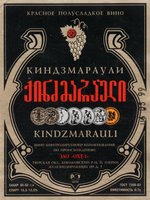 Russia has imposed a blockade on imports of wines from former soviet republics of Georgia and Moldova, New York Times reports in its Thursday issue. Russian authorities claim that the ban is due to high concentrations of heavy metals and pesticides in the wines, but there is little doubt that this blockade is politically motivated.
Russia has imposed a blockade on imports of wines from former soviet republics of Georgia and Moldova, New York Times reports in its Thursday issue. Russian authorities claim that the ban is due to high concentrations of heavy metals and pesticides in the wines, but there is little doubt that this blockade is politically motivated.The story, brought to my attention by Caucasus analyst Svante Cornell, puts the finger on a number of delicate issues pertaining to Russia's policy towards its "near abroad".
Russia has had great difficulties to come to terms with its waning influence in its "soft underbelly". Setbacks have been many in the last few years, not least by the coloured revolutions in Georgia and Ukraine.
Georgia's government under Mikheil Saakashvili has pursued a much more independent policy than was the case in the 1990's, to Moscow's great annoyance. Demands for a withdrawal of Russian troops from Georgian territory, and some Georgian success in bringing Russia-supported secessionist regions back in line threaten to curve Russian influence in a region it traditionally sees as its "sphere of vital interests".
In Moldova, president Vladimir Voronin has also been negative to Russian influence and the stalemate Moscow has put on the matter of the secessionist Transnistria region. Due not least to Ukrainian and EU efforts over the past year, the smuggling that sustains Transnistria, has been put in relative cheque. The combination of a more critical Moldovan stance towards Russia with reduced possibilities of Transnistria sustaining itself by trafficking, has brought about today's hostile relationship between Moscow and Chisinau.
Consequently, nobody really believes in Moscow's explanation of unhealthy contents in Georgian and Moldovan wines as the real reason for Russia's wine ban. Instead, the ban obviously intends to put pressure on the two states' economies, which both rely heavily on wine production for export revenues.
Also, Russian measures put Moscow's will to integrate in the world economy as well as the country's dedication to free trade in question. This should be embarrasing to the "masters of the Kremlin" at a time when Russia holds the presidency of the G 8 - the prestigious group of industrialised nations to which Russia gained access just a few years back. Furthermore, if worse comes to worst, Russia's wine ban might impair the country's long-standing ambition to join the World Trade Organization.



4 comments:
It is purely political decision and therefore purely illogical. I don't see any good sense in banning Georgian and Moldovian wines. How will Russia compensate the lack of Georgian and Moldovian wines? By buying French or Chilian wines? I doubt that majority of Russians can afford it at the same quantities as Georgian and Moldovian wines.
Hmmmm ... they could compensate by drinking more vodka, but there has been a shortage of the new tax labels for liquor. ;-)
It is very heavy-handed trade tactics, but that is nothing new. It would be better for Russia, of course, if they could focus on being more competitive with their own products on the world market, to create real job and income growth for the lower and middle classes. However, that stuff is hard, banning products from other nations is relatively simple.
Dear friends,
What is there else to do but to totally and whole-heartedly agree with you. This is utter lunacy! Russians have been drinking these wines for centuries and they form part of a more moderate and cultivated drinking-tradition. What would the Russian cuisine be without a Georgian claret to carry it? In the meanwhile, however, the situation is equally confusing for wine vendors and consumers. French, Bulgarian, Australian wines or whatever, are simply not the same. Turning from traditions to the lack of them, it is all too obvious that Russia has troubles to come to terms with modern free trade and economy.
Yours,
Vilhelm
http://www.pravda.com.ua/news/2006/5/22/41964.htm - the posters supporting Georgian wine in Ukraine (below it is mentioned "Banned in Russia". They are placed all around Kyiv and that was made specially for the GUAM meeting happening these days.
Post a Comment